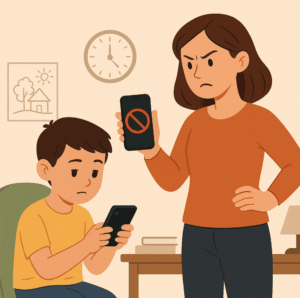📵 How to Control Mobile Usage in Children: A Parent’s Guide to Raising Digitally Healthy Kids
 In today’s world, mobile phones have become digital babysitters. While they offer convenience and learning opportunities, unchecked use can quietly erode a child’s attention, creativity, sleep, and even emotional resilience. As a psychiatrist and a parent educator, I’ve seen first-hand how crucial it is to set healthy screen boundaries early on.
In today’s world, mobile phones have become digital babysitters. While they offer convenience and learning opportunities, unchecked use can quietly erode a child’s attention, creativity, sleep, and even emotional resilience. As a psychiatrist and a parent educator, I’ve seen first-hand how crucial it is to set healthy screen boundaries early on.
This article offers age-appropriate, practical tips for parents who are struggling to balance screen time in a tech-dominated world.
🧠 Why Should You Worry About Mobile Overuse?
Studies show that too much screen time in children can lead to:
-
Delayed speech and language development
-
Poor sleep hygiene (especially due to blue light exposure at night)
-
Behavioral issues and emotional outbursts
-
Reduced attention span and creativity
-
Higher risk for anxiety, depression, and digital addiction in teens
👨👩👧👦 The Golden Rules of Healthy Mobile Use
Regardless of age, there are a few non-negotiables:
-
Be a Role Model: Children learn by watching you. If you’re glued to your phone, they will be too.
-
Create Tech-Free Zones: Meals, bedrooms, and study areas should be free from mobile devices.
-
Explain the ‘Why’: Help them understand that screen limits are meant to protect their eyes, brain, and mood—not to punish them.
-
Balance is Key: Match screen time with equal time for physical activity, creativity, or social play.
🎯 Age-Wise Screen Time Guidelines
🧸 Under 2 Years
-
Avoid mobile screens altogether except for video calls with loved ones.
-
Prioritize human interaction, face-to-face communication, and free play.
🎨 Ages 2–5
-
Limit to 1 hour per day of high-quality programming.
-
Co-view content and talk about what they watch. It’s a shared experience, not a solo activity.
-
Prefer educational platforms (e.g., YouTube Kids, CBeebies, PBS Kids).
🧒 Ages 6–12
-
Stick to 1–2 hours per day (excluding school-related use).
-
Introduce a Screen Time Contract: “30 minutes of mobile = 30 minutes of outdoor play.”
-
Avoid giving personal smartphones too early; use a shared family device.
-
Enable Parental Controls using tools like Google Family Link or Apple Screen Time.
👦 Ages 13+ (Teens)
-
Engage them in setting mutual limits and encourage responsibility.
-
Promote “Tech-Free Sundays” or digital detox evenings.
-
Monitor signs of mobile overuse such as declining academic performance, mood swings, or irritability when away from devices.
-
Discuss safe digital behavior—sexting, online predators, cyberbullying.
🛠️ Tools That Help
-
Google Family Link / Apple Screen Time: Track and limit app usage.
-
Bark, Qustodio, Net Nanny: Advanced tools for web filtering and screen time limits.
-
Forest App: Turns staying off the phone into a fun focus game.
-
“No-Screen Zones” signage at home: Simple, visual reminders help reinforce habits.
💬 What to Say When They Resist
Instead of “Because I said so,” try:
-
“I’m not taking your phone away to be mean. I’m doing this to protect your brain and your mood.”
-
“Let’s earn screen time with a fun game or a walk together.”
-
“I need a break from my phone too. Let’s do something else for 30 minutes.”
🚩 Red Flags to Watch For
-
Withdrawal symptoms without mobile access (irritability, boredom)
-
Lying or sneaking device use
-
Loss of interest in outdoor play or family time
-
Poor sleep and daytime fatigue
These could signal screen addiction, and it’s important to intervene early.
✅ Healthier Alternatives to Screen Time
Encourage children to:
-
Build with LEGO, draw, or write short stories
-
Play outdoor games, garden, or cycle
-
Learn a musical instrument or new skill
-
Join hobby groups like chess, arts and crafts, or drama clubs
-
Maintain a sleep routine and regular face-to-face family time
💡 Final Word
Setting boundaries on mobile use isn’t about control—it’s about care. In the long run, children who learn to delay gratification, regulate their impulses, and stay engaged with the real world are more likely to succeed academically, emotionally, and socially.
If you’re finding it hard to manage screen time at home or notice behavioral issues linked to mobile use, consider consulting a mental health professional.
📍Need help managing screen time and emotional health in children? I’m here to support.
Dr. Srinivas Rajkumar T, MBBS, MD (Psychiatry)
Consultant Psychiatrist
Apollo Clinics Velachery & Tambaram .
Specialist in Child & Adolescent Mental Health
📞 Online & Offline Consultations | 🧠 Expert in Digital Addiction & Emotional Wellness
🌐 Visit: www.srinivasaiims.com